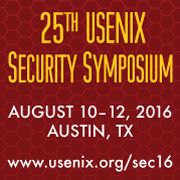
Get more
Help Promote graphics!
Fast, Lean, and Accurate: Modeling Password Guessability Using Neural Networks
LISA: Where systems engineering and operations professionals share real-world knowledge about designing, building, and maintaining the critical systems of our interconnected world.
The LISA conference has long served as the annual vendor-neutral meeting place for the wider system administration community. The LISA14 program recognized the overlap and differences between traditional and modern IT operations and engineering, and developed a highly-curated program around 5 key topics: Systems Engineering, Security, Culture, DevOps, and Monitoring/Metrics. The program included 22 half- and full-day training sessions; 10 workshops; and a conference program consisting of 50 invited talks, panels, refereed paper presentations, and mini-tutorials.
William Melicher, Blase Ur, Sean M. Segreti, Saranga Komanduri, Lujo Bauer, Nicolas Christin, and Lorrie Faith Cranor, Carnegie Mellon University
Awarded Best Paper
Human-chosen text passwords, today’s dominant form of authentication, are vulnerable to guessing attacks. Unfortunately, existing approaches for evaluating password strength by modeling adversarial password guessing are either inaccurate or orders of magnitude too large and too slow for real-time, client-side password checking. We propose using artificial neural networks to model text passwords’ resistance to guessing attacks and explore how different architectures and training methods impact neural networks’ guessing effectiveness. We show that neural networks can often guess passwords more effectively than state-of-the-art approaches, such as probabilistic context-free grammars and Markov models. We also show that our neural networks can be highly compressed—to as little as hundreds of kilobytes— without substantially worsening guessing effectiveness. Building on these results, we implement in JavaScript the first principled client-side model of password guessing, which analyzes a password’s resistance to a guessing attack of arbitrary duration with sub-second latency. Together, our contributions enable more accurate and practical password checking than was previously possible.
Open Access Media
USENIX is committed to Open Access to the research presented at our events. Papers and proceedings are freely available to everyone once the event begins. Any video, audio, and/or slides that are posted after the event are also free and open to everyone. Support USENIX and our commitment to Open Access.
author = {William Melicher and Blase Ur and Sean M. Segreti and Saranga Komanduri and Lujo Bauer and Nicolas Christin and Lorrie Faith Cranor},
title = {Fast, Lean, and Accurate: Modeling Password Guessability Using Neural Networks},
booktitle = {25th USENIX Security Symposium (USENIX Security 16)},
year = {2016},
isbn = {978-1-931971-32-4},
address = {Austin, TX},
pages = {175--191},
url = {https://www.usenix.org/conference/usenixsecurity16/technical-sessions/presentation/melicher},
publisher = {USENIX Association},
month = aug
}


















connect with us